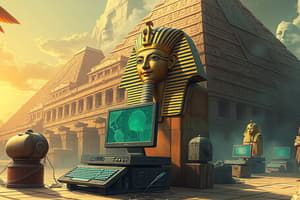Podcast
Questions and Answers
What did the clay cuneiform tables primarily contain?
What did the clay cuneiform tables primarily contain?
- Tables for geometry proofs
- Tables for advanced calculus
- Tables for various mathematical operations (correct)
- Tables for astronomical calculations
What numerical system did the Babylonians use?
What numerical system did the Babylonians use?
- A base-10 system with digits 0-9
- A system using only two symbols: 1 and 10 (correct)
- A base-12 system with unique symbols
- A binary system using only 1 and 0
Which theorem is credited to Thales?
Which theorem is credited to Thales?
- Euclid's first theorem
- Pythagorean theorem
- Archimedes’ principle
- Thales’ theorem (correct)
What was the purpose of the counting boards in early civilizations?
What was the purpose of the counting boards in early civilizations?
What belief was shared by the members of the Pythagorean society?
What belief was shared by the members of the Pythagorean society?
What was one of the practical problems solved by Egyptian mathematics?
What was one of the practical problems solved by Egyptian mathematics?
What numerical system did the Egyptians use?
What numerical system did the Egyptians use?
What was the Rhind Papyrus used for?
What was the Rhind Papyrus used for?
Which civilization thrived in Mesopotamia around 2000 BC?
Which civilization thrived in Mesopotamia around 2000 BC?
What was one benefit of technological advancements mentioned?
What was one benefit of technological advancements mentioned?
Which activity is NOT classified as computing?
Which activity is NOT classified as computing?
The contributions of early civilizations are considered what for modern computing?
The contributions of early civilizations are considered what for modern computing?
What was a significant aspect of the Egyptian numerical system?
What was a significant aspect of the Egyptian numerical system?
Flashcards are hidden until you start studying
Study Notes
Introduction to Computing and the Egyptians
- The evolution of technological change has significantly impacted society, enhancing living standards through advancements like computers and the Internet.
- Egyptian mathematics solved practical problems including measuring time, calculating land area, managing bookkeeping, and assessing taxes.
- Utilized a base 10 numerical system with distinct symbols for varying magnitudes: one, ten, hundred, thousand, ten thousand, and hundred thousand.
- The Rhind Papyrus is a notable Egyptian document that serves as an arithmetic and geometric reference, used for educational purposes in relation to the Pharaoh's construction projects.
Early Civilizations Contributions
- Early civilizations provide foundational principles crucial to the development of modern computing.
The Babylonians
- Thrived in Mesopotamia (current Iraq) from around 2000 BC to 500 BC.
- Mathematical texts were recorded on clay cuneiform tables, deciphered in the 19th century, featuring tables for arithmetic, cubes, and square roots.
- Employed a numerical system with only two symbols (1 and 10), allowing for the combination to represent all other numbers.
- Counting boards assisted in calculations, resembling an abacus, which predates them, suggesting a long-standing tradition of computational tools.
The Greeks
- Key figures include Pythagoras and Thales, who significantly advanced geometric concepts around 500-600 BC.
- Pythagoras, influenced by Egyptian mathematics, founded a secret society, the Pythagoreans, which explored the spiritual significance of numbers.
- Acknowledged for the Pythagorean theorem, which may have been known to Babylonians a millennium beforehand.
- Thales is renowned for his theorem in Euclidean geometry, articulating that for points A, B, and C on a circle, with AC as the diameter, certain angle properties hold true.
Studying That Suits You
Use AI to generate personalized quizzes and flashcards to suit your learning preferences.



